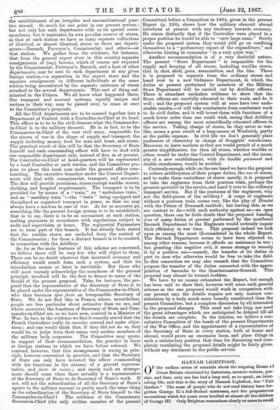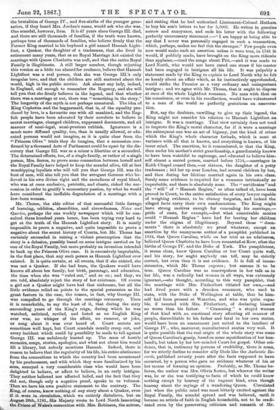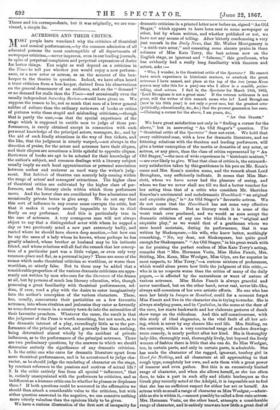HANNAH LIGHTFOOT.
OF the endless series of scandals about the reigning House o f Great Britain circulated by historians, memoir-writers, gos- sips, and liars, only one has had a long and, so to speak, an inter- esting life, and that is the story of Hannah Lightfoot, the " Fair Quaker." The mass of people who do not read history have for- gotten George II.'s fall-fleshed mistresses, and the preposterous accusations which for years were levelled at almost all the children of George III. Only Brighton remembers clearly or cares to recall the brutalities of George IV., and five-sixths of the younger gene- ration, if they heard Mrs. Jordan's name, would ask who she was. One scandal, however, lives. It is 47 years since George ILL died, and there are still thousands of families, if the truth were known, perhaps tens of thousands of families, who believe firmly that the Farmer King married in his boyhood a girl named Hannah Light- foot, a Quaker, the daughter of a tradesman, that she lived in retirement many years, that as no Royal Marriage Act existed the marriage with Queen Charlotte was null, and that the entire Royal Family is illegitimate. A still larger number, though rejecting this version as a little too absurd for credence, believe that Hannah Lightfoot was a real person, that she was George Di's only irregular love, and that the children are still scattered about the world, high in the, public service. Ask almost any lady, indeed, in England, old enough to remember the Regency, and she will tell you that she firmly believes in the legend, and that whether there was a. marriage or not, there was "something in the story." The longevity of the myth is not perhaps unnatural. The idea of King Cophetua and the beggarmaid, that is, of the equality pro- duced by love, is a favourite one with all mankind, and the Eng- lish people have been educated by their novelists to believe in secret marriages, changed children, suppressed documents, and all manner of semi-legal, semi-prurient rubbish. Ignorance is a much more diffused quality, too, than is usually allowed, or eclat. 'anted persons would not imagine, as it is quite clear from the -" Princess Olive " trials they do imagine, that a succession con- firmed by a thousand Acts of Parliament could be upset by the dis- covery that George III. was as a minor a libertine or a scoundrel. The determined efforts, too, of a single family, or rather of a single person, Mrs. Serres, to prove some connection between herself and the Royal Family have helped to keep the scandal alive, till at last worshipping loyalists who will tell you that George III. was the best of men, will also tell you that the arrogant German who be- lieved in his own divine right and the sacredness of royal blood, who was at once exclusive, patriotic, and chaste, risked the suc- cession in order to gratify a momentary passion, by what he would have considered the ineffable. degradation of a marriage with a low-born woman..
Mr. Thorns,. the able editor of that successful little farrago of learning, oddities,.. absurdities, and shrewdnesses, Notes and Queries, perhaps the one weekly newspaper which will be con- sulted three hundred years hence, has been trying,very hard to get at the truth of . the Hannah Lightfoot story. It is nearly impossible to prove a negative, and quite impossible to prove a negative about the secret history of. Courts, but Mr. Thorns has -certainly succeeded in raising a •violent presumption that the story is a delusion, possibly based on some intrigue carried on by one of the Royal Family, but more probably an invention intended to back up the Princess Olive case. It is excessively improbable, in .the first place, that any such person as Hannah Lightfoot ever existed. It is quite certain, at all events, that if she existed, she was not a Quaker. If she had been, the Quakers would have known all about her family, her birth, parentage, and education, the time when she was. "ruled out," and so on ; and they, we sre told, absolutely reject the story of her. existence. Of course a girl not a Quaker might have had that nickname, but all the little evidence relied on points to the special persuasion as the great feature in the case, the reason, in fact, why George la was compelled to go through the marriage ceremony. Then it is remarkable, to say the least of it, that during the sixty :succeeding years of the King's reign, during which he was watched, satirized, reviled, and hated as no English King ever was, no whisper of the affair, no rumour, or joke, or song about it was ever heard of. Court secrets are sometimes well kept, but Court scandals usually creep out, and every incident which could by possibility be made to tell against George ILL was sedulously hunted up. The mass of hostile memoirs, songs, stories, apologies, and what not about him would All a library, but nobody mentions Hannah Indeed, there is reason to believe that the regularity of his life, his entire abstinence from the connections to which the country had been accustomed by his predecessors, and with which they were familiarized by his sons, annoyed a very considerable class who would have been delighted to believe, or affect to believe, in an early intrigue. They neither believed nor affected belief, and the fact that they did not, though only a negative proof, speaks to us volumes. Then we have his own positive statement to the contrary. The .King, of course, knew nothing of any story about a Quaker, even if it were in circulation, which we entirely disbelieve, but; on August 28th, 1781, His Majesty wrote to Lord North lamenting the. Prince of Wales's connection with Mrs. Robinson, the actress,
and stating that he had authorized Lieutenant-Colonel Ilotham to buy his son's letters to her for 5,0001. Ha writes in genuine sorrow and annoyance, and ends his letter with the following perfectly unnecessary statement :—" I am happy at being able to say that I never was personally engaged in such a transaction, which, perhaps, makes me feel this the stronger." Few people even now would make such an assertion unless it were true, in 1781 it would, if publicly made, have brought on the King more ridicule than applause,—read the songs about Pitt,---and it was made to Lord North, who would not have cared one straw if his master
had been engaged in intrigues all his life. It was palpably a statement made by the King to explain to Lord North why he felt
so keenly about an affair which, as he inatinotively apprehended, would strike the Premier as a very ordinary and unimportant intrigue ; and we agree with Mr. Thorns, that it ought to dispose at once of the whole Lightfoot romance. No man with that on his conscience, or even in his recollection, would have volunteered to a man of the world so perfectly gratuitous an assevera- tion.
But, say the doubters, unwilling to give up their legend, the King might not consider his relation to Hannah Lightfoot an intrigue. It was a marriage. That view certainly does not tend. to improve the King's moral character, for if it were a marriage the subsequent one was an act of bigamy, just the kind of crime which the King's whole character forbade, which is most at variance with all that is known, and everything is known, of his inner mind. The assertion, be it remembered, is that the King, then under his mother's strict guardianshipra guardianship known to have been watchful to espionage, and educated to believe him- self almost a sacred person, married before 1754,—marriages- in Keith Chapel ceased then,—at sixteen, the daughter of a petty tradesman ; hid her up near London, had several children by her, and then during her lifetime married again in his own class. Surely some evidence is required for a romance intrinsically so improbable, and there is absolutely none. The " certificates" and the " will" of " Hannah Regina," so often talked of, have been proved in Court, to the entire satisfaction of every lawyer capable of weighing evidence, to be clumsy forgeries, and indeed the alleged facts carry their own. condemnation. The King might have strong motives enough for concealing his marriage,— pride of caste, for example,—but what conceivable motive could " Hannah Regina " have had for leaving her children under the stigma of illegitimacy. Beyond these " doom- ments " there is absolutely no proof whatever, except an assertion by the anonymous author of a pamphlet published in 1824, that Queen Caroline, while on her trial as an adulteress, believed Queen Charlotte to have been remarried at Kew, after the births of George IV. and the Duke of York.. The pamphleteer, it seems clear, knew Queen Caroline or her Court quite well, and his story, for aught anybody can tell, may ba strictly correct, but even then it is not evidence. It is full of Meow? sistencies, which Mr. Thorns exposes ; but assume it to be true. Queen Caroline was as unscrupulous in her talk, as in her life, was a radically bad woman in all ways, was extremely ignorant,—she thought, according to this very pamphlet, that the marriage with Mrs. Fitzherbert vitiated her own,—and had lived years with a drunken romancer, who used to state, with the Duke of Wellington at table, that he him- self had been present at Waterloo, and who was quite capa, ble, if taunted with Mrs. Fitzherbert, of declaring himself no worse than his father. " Cramming " a stupid woman of that kind with an emotional story affecting all manner of people, discreditable to his father and fatal to her own status, would have been an amusement just suited to the intellect of George IV., who, moreover, manufactured stories very well. It is quite possible that the real origin of the whole story was some of Queen Caroline's gossip, based on some mystification of her hue- band's, but taken by her low-minded Court for gospel. Other evi- dence, that is, testimony by persons of credibility, there is none, for we utterly decline to consider silly libels like the Authentic Re- cords, published seventy years after the facts supposed to have occurred, by a person who gave no evidence whatever of his or her means of forming an opinion. Probably, as Mr. Thorns be- lieves, the author was Mrs. Olivia Serres, but whoever the writer was, he or she was testifying to facts of which he could know nothing except by hearsay of the vaguest kind, even though hearsay about the sayings of a wandering Queen. Circulated just when the public mind was most bitterly excited against the Royal Family, the scandal spread and was believed, until it became an article of faith in English households, not to be eradi- cated even by the persevering criticism and research of Mr.
Thome and his correspondents, but it was originally, we are con- vinced, a simple lie.
































 Previous page
Previous page